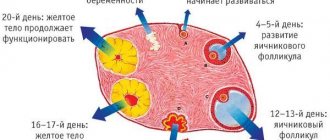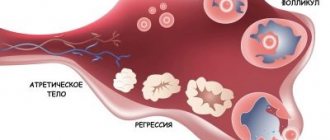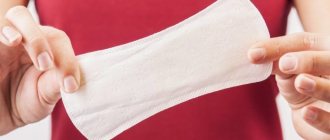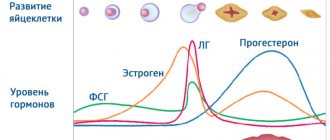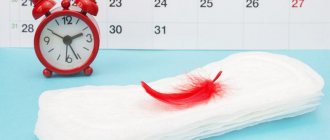What affects the quality of female cells
Over the course of a woman's life, the number and quality of eggs changes. It is difficult to somehow influence their number: the older a woman is, the fewer there are. But quality is related to many different factors. Here are some of those that negatively affect the egg:
- Bad habits;
- Poor nutrition;
- Lack of rest and sleep;
- Mature age;
- Excess weight.
A woman’s age is a fairly significant factor that affects the quality/number of eggs. After 40 years, women have healthy only 15-20% of cells. Under such conditions, there is a high risk of giving birth to a child with chromosomal abnormalities. It should also be taken into account that with age, the ability to become pregnant naturally decreases rapidly, since after 35 years the number of eggs quickly decreases.
What is an oocyte
To carry out conception in a test tube, the presence of mature eggs and active sperm is necessary. Oocyte is the scientific name for a female egg, however, it is not yet the actual egg - its predecessor. The ovaries of a healthy woman produce about half a million oocytes, from which eggs are then formed.
There is one mature egg per 1000 oocytes. Every month, several oocytes (first-order oocytes) begin to mature in a woman’s body; this process ends with ovulation. As a rule, only one egg matures (2nd order oocyte), and the remaining oocytes die. The process of development of germ cells from primary to mature for fertilization is called oogenesis.
Where do sex cells come from? They begin to form in the girl’s body during the prenatal period. Before puberty, cells are in a “dormant” state. Then the girl’s body undergoes a monthly process of maturation of germ cells. If fertilization does not occur, the cells leave the body during menstruation.
How to improve cell quality
In order to improve the quality of eggs, women who are planning to become pregnant need to eat a balanced diet, have enough time to rest and sleep, constantly exercise, get rid of bad habits, pay increased attention to health, and drink vitamins. Compliance with these conditions will keep the eggs in proper condition and will improve the health of the entire body.
Proper nutrition is very important. Those planning a pregnancy should not forget to saturate their diet with proteins of animal/plant origin and polyunsaturated fatty acids.
Excessive protein content in food, as well as its lack, negatively affects fertility.
However, not every time leading a healthy lifestyle is enough to obtain high-quality cells that can be fertilized and develop in the future. This is especially true for women over 40, whose egg supply/quality is much lower. What to do in this case?
Elena: endometrial growth in Asherman's syndrome
History: AMH 0.8, other hormones are normal. She ovulates through the cycle, but the endometrium grows poorly - 10 years ago it was damaged during the cleansing process after childbirth (atresia of the cervical canal formed). Diagnosis of Asherman's, synechia. 5 years have passed since then. There were no pregnancies. In February 2021, a hysteroscopy was performed to dissect intrauterine synechiae. Now they are gone. But the endometrium does not grow more than 4-5 mm. Preparing for IVF.
Took: Solgar antioxidant , omega-3, D3, ubiquinol, Inositol, arginine, Natural Sources ovarian bioregulator, Raw Female .
We tried for 4 months to build up my endometrium with horse estrogens, starting in February after mystera. With the drugs proginova and cycloproginova, I took one tablet from each pack at a time. Then I stopped drinking them. I started using estrogel for 3 months. But it doesn’t grow on anything more than 4-5 mm. I learned about raw female peptides for the first time, as well as about ovariamine itself. In June, I didn’t take or apply any estrogens, only peptides and vitamins (as always) - at 15 days the endometrium grew 7 mm, there was good ovulation. I am very glad that the drug works.
Elena, 40 years old
Drug therapy
If you can’t get pregnant, or you’ve already had unsuccessful IVF attempts, then the problem may be due to poor egg quality. To check, you need to do an analysis to determine the quality of female cells. Based on the information received, the doctor will be able to develop a suitable treatment regimen for you. Are there specific recommendations for improving egg quality?
Regardless, you should consult a doctor before doing anything. However, there are also universal regimens that include mineral/vitamin complexes. As a rule, they are prescribed by doctors 3 months before planning a pregnancy.
- Folic acid (100 mcg). You should drink 2 tablets 2 times a day. Dose per day – 400 mcg.
- Vitamin E in capsules of 100 mg is drunk 2 times a day, 1 capsule. Considering that flaxseed oil contains enough vitamin E, you do not need to drink it additionally.
- Multivitamins. Those intended for women planning to become pregnant are suitable. Pregnacare is often prescribed. Drink once a day.
- Linseed oil. Drink at least 2 tablespoons per day.
This scheme will be relevant for most women, however, certain vitamins may be contraindicated for some due to allergies to certain types. Then the diagram will look like this:
- Folic acid – 100 mcg, 2 tablets 4 times a day.
- Vitamin E capsules 100 mg, 1 capsule 1 time per day.
- Linseed oil. 2 or more tablespoons per day.
Women over 40 are often prescribed individual hormonal therapy. This makes it possible to improve the quality of eggs. This will be especially effective on the eve of IVF. The most effective remedies are considered to be Buserelin, Zoladex, Diferelin. The dosage/duration of treatment is prescribed by the doctor. However, as a rule, the duration does not exceed 2 weeks.
Zoryana: long-awaited pregnancy
History: no pregnancies, low ovarian reserve (AMH 0.4), endometrial hyperplasia (underwent hysteroscopy), increased prolactin. We did 2 IVFs with stimulation - 5 eggs and all bad. Doctors offer only donor blood.
Took: compositums, viargons: 01.13; Guna drugs for the prevention of the inflammatory reaction in the endometrium (cytokine correction), which is a component of immune infertility. Vitex and melatonin were added to Dostinex (prolactin was 15.5 on Dostinex). Raw vitamins, Ubiquinol, vitamin D3, folate, inositol, spirulina, Omega-3. I took the DHEA supplement on my own, but after checking this hormone in the blood, it was canceled (it was already approaching the upper norm). My husband, 2.5 months before IVF, underwent a program to improve his sperm count.
We corresponded with Zoryana for about a year, and adjusted the scheme twice. Using supplements and compositums, we managed to raise the AMH to 0.9, and continued to try it in a natural cycle. Gynecologists noted an improvement in ovarian function.
At the end of January 2021, the scheme was repeated, but with an emphasis on reducing prolactin and endometrial health, and flurevits were included.
I receive the following letter dated 02/21/19:
Today we did a puncture of 3 follicles (ovulation was on the 18th day, usually on the 13th), caught 1 degenerative one... washed 4 times, injected hCG before the puncture. It’s very difficult, because I thought at least one would be caught... For some reason, there have been no eggs lately, what could this mean? Maybe there is not enough hCG before the puncture and a larger dose is needed for the egg to separate? I read about this, the doctors don’t say anything, they are apparently annoyed that I’m being treated myself, in general they tell me not to take anything anymore

